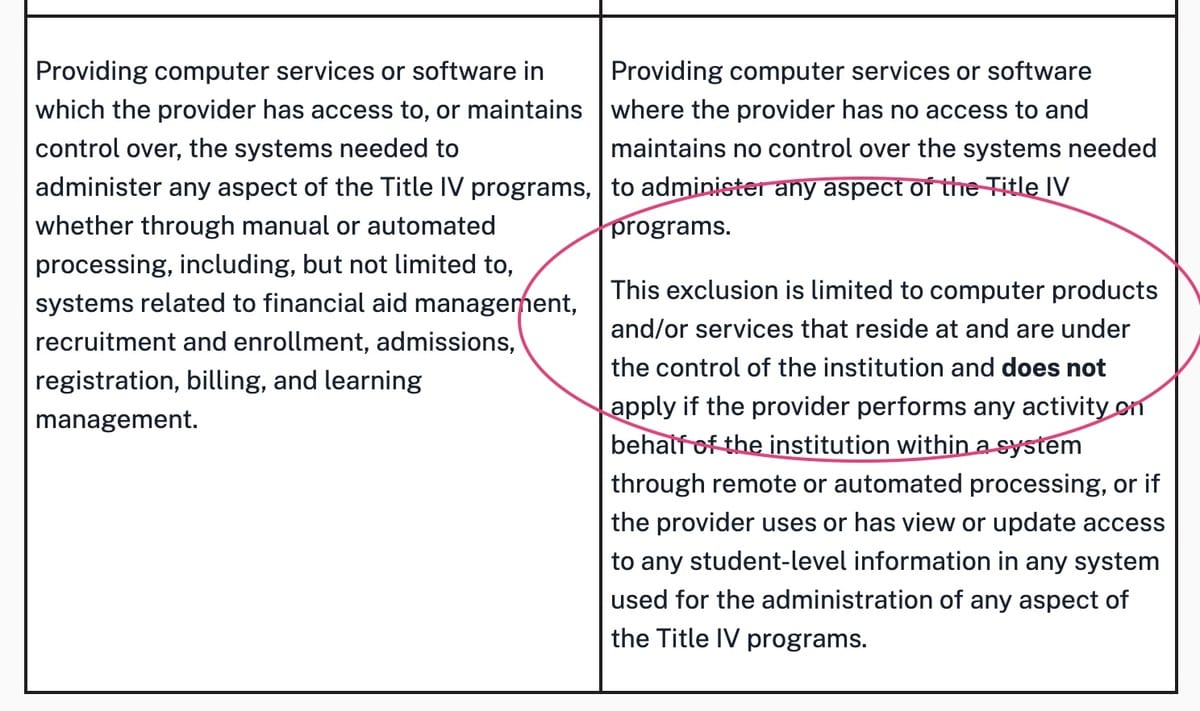ED Staff Should Read Their Own Guidance
More absurd arguments, although there are positive signs

I know that I promised to move towards OPM rev share coverage this week, but some recent statements from the US Department of Education (ED) need to be called out.
Was this forwarded to you by a friend? Sign up, and get your own copy of the news that mattered sent to your inbox every week. Sign up for the On EdTech newsletter
Interested in additional analysis? It’s free through May 24, 2023. Upgrade to the On EdTech+ newsletter
On to the update.
I have covered in some depth how the advocates behind the third-party servicer (TPS) expansion Dear Colleague Letter (DCL) are making an absurd argument that “the new language on computer services that are TPS activities is really just a clarification of a 2016 DCL.” The core of my argument is showing that ED deliberately added a new bullet in the definition of TPS functions:
To provide Title IV-eligible educational programs;
This addition was intentional and is the source of the broad expansion of which vendors might be considered a third-party servicer (TPS). Now programs refer not just to financial aid programs (e.g., Stafford loans) but also to educational programs (e.g., online MBA), an entirely different beast. This phrase has never been in previous ED guidance, and with it, ED now includes learning management, instruction, student retention, basically anything that ED wants to consider as necessary for that educational program. True, the DCL is vague and contradicts itself in several areas, but that is a problem, not a virtue.
ED Statements
The post “A Matter of Kind, Not Degree” focused on absurd complaints from advocates, but now we are seeing ED itself making absurd arguments.
Times Higher Education posted an article earlier this week focused on the international angle - how the TPS expansion would cut out foreign-owned entities - and a spokesman for ED directly discussed the issue surrounding organizations providing computer services or software.
The Department of Education, responding to questions from Times Higher Education, partially backed away from the crackdown order that it issued last month, which it aimed at a broad range of companies working with US colleges and universities in areas that include course delivery.
“Our greatest concern is the area of recruitment and activities tied to the administration of federal student aid funds, not broadly used software solutions,” a departmental spokesman told THE.
Then why did they add that new phrase that specifically pulled in software solutions?
Missing Context
Further in the article:
The department’s order made particular note of its interest in companies involved in “the provision of educational content and instruction”, calling such curricular activities arguably related to the use of federal student aid.
Along with de-emphasising that language, the Education Department told THE that institutions should pay greater attention to the part of its announcement where it excluded companies that sell a product but then leave the college or university to operate it. “Providing computer services or software where the provider has no access to or control over systems needed to administer any part of Title IV would not fall in the category of a third-party servicer,” it said.
Really? Let’s look at the actual Dear Colleague Letter language.

The ED spokesman neglected to mention the highlighted phrase [emphasis added]:
Providing computer services or software where the provider has no access to and maintains no control over the systems needed to administer any aspect of the Title IV programs.
This exclusion is limited to computer products and/or services that reside at and are under the control of the institution
In the LMS market, all three top vendors (Instructure Canvas, D2L Brightspace, Blackboard Learn by Anthology) work in the cloud, so this exclusion would only apply if a campus was using a self-hosted Moodle instance. That seems like important context.
There are plenty of other EdTech markets where this same situation applies.
This TPS DCL situation is a disaster, and ED should stop its silly games of pretending that the DCL doesn’t say what it does. Instead, ED should withdraw the DCL guidance, rewrite it with significantly limited scope, and work it through negotiated rule making or some process to get real input from the higher ed community. So that ED can get it right.
The Good News
It is good news, however, that ED appears to be heading towards a narrower scope that doesn’t pull in “broadly used software solutions” not directly tied to administration of financial aid (which was, by the way, the intent of the regulations).
But ED needs to do this with DCL recision or replacement with clear language. It is not enough to essentially say trust us, we won’t take action in these categories. Note the specific language in the interview. The ED spokesman did not say we did not mean to include broadly used software solutions, they instead said that their greater concern was recruitment and administration of Title IV financial aid programs.
ED seems insistent on broadening the scope of TPS categorization to encompass student recruitment, however. That is still an expansion of scope that does not appear to be consistent with the regulatory language, but at least it is a more narrow argument.
The main On EdTech newsletter is free to share in part or in whole. All I ask is attribution.
Thanks for being a subscriber.